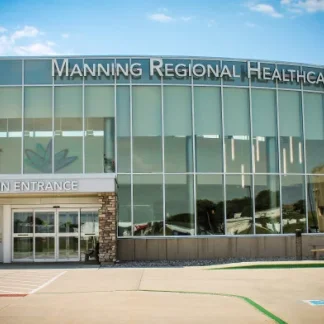Manning Regional Healthcare Center
Manning, Iowa, 1550 6th street, 51455
Available Programs
- Adult program
- Program for men
- Program for women
- Young adult program
Insurance and Financial
- Medicaid
- Private insurance
- Self-pay options
- Medicare
- Military insurance
About this Facility
The Manning Regional Healthcare Center is a 16 bed, co-ed chemical dependency drug rehab center specializing in treating drug and alcohol addiction. This addiction treatment center is found in Manning, Iowa, and is operated by trusted experts trained to provide substance abuse addiction care. This care involves behavioral therapies and social support to help with long term sobriety.
The thing that differentiates the Manning Regional Healthcare Center from other addiction treatment centers is that it is a department within the critical access hospital.
This means the rehab center’s staff is equipped to handle all addiction cases, including drug and alcohol addiction.
With more than four decades of offering substance abuse treatment programs, this drug rehab can help. To learn more about the programs, read below:
The residential treatment program offered at Manning Regional Healthcare Center provides addiction treatment in an inpatient setting. Those who enroll in this program will be required to participate for about 30 days, and the maximum number of patients treated at any given time is 16, according to Iowa licensing guidelines.
In addition, individuals receive about 31 hours of treatment services weekly alongside two to three hour individual sessions with licensed counselors. Often, treatment plans include family visitations and sessions alongside NA and AA meeting attendance during this program.
The detoxification program offered at this addiction treatment center is dedicated to helping individuals overcome withdrawal symptoms and cravings.
During this program, individuals are medically supervised 24 hours a day in an onsite setting for one to five days, depending on the severity of the addiction. After detoxification, this rehab center will recommend individualized treatment programs and referrals.
Not everyone can leave home for extended periods of time, which the Manning Regional Healthcare Center understands. That’s why they operate an outpatient program with differing addiction treatment timelines.
Typically, the outpatient treatment offered by this rehab center requires nine hours of weekly sessions, lasting between three months to a year, depending on substance abuse recovery needs. These sessions are operated by licensed counselors who work with clients to create individualized programming.
Contact us for more information: (712) 655-2072

Contact Manning Regional Healthcare Center
Connect with Manning Regional Healthcare Center by calling their admissions team directly.
(712) 655-2072 Website Get Directions